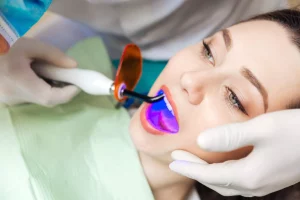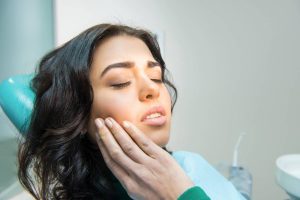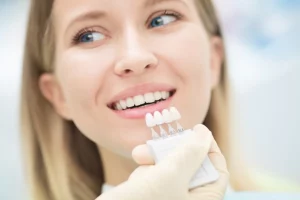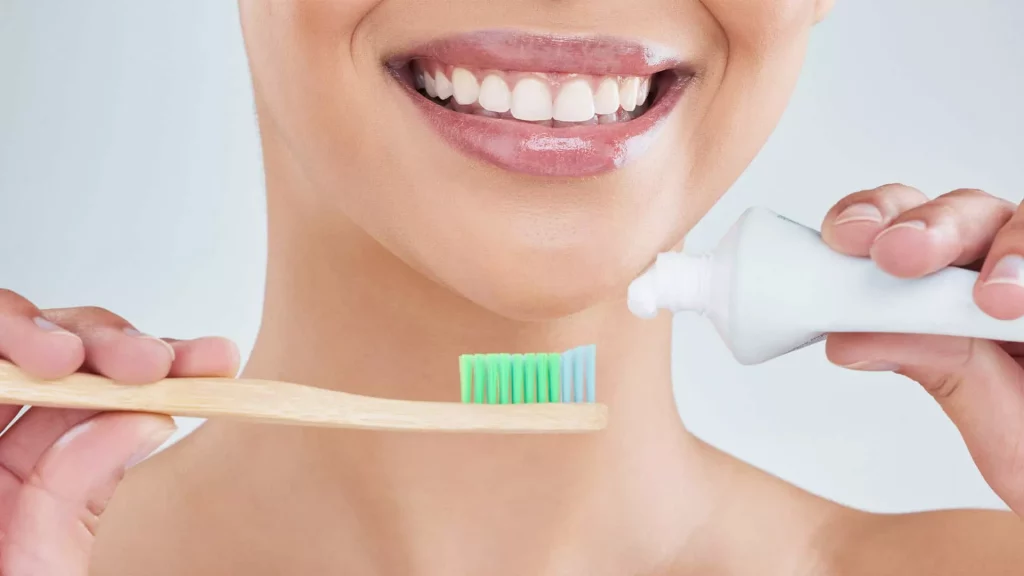Last Updated on: 9th December 2025, 02:09 pm
Speech problems in children can often be caused by dental issues like misaligned teeth, tongue-tie, or mouth breathing. These conditions affect how the mouth functions during speech. Early dental and hearing checkups can help identify and treat the root cause.
Many kids struggle with speech; sometimes, the cause is right inside the mouth.
We usually think that speech problems come from the brain or are caused by learning delays. But in many cases, it happens because the teeth, tongue, or jaw are not working well. A child’s mouth plays a big role in how they pronounce words, and issues like misaligned teeth, being tongue-tied, or breathing through the mouth can make it harder for them to speak clearly.
Let’s see how dental problems can affect speech, what signs to look for, and some treatments and dental care ideas to help your child speak more clearly and with confidence.
What are speech problems?
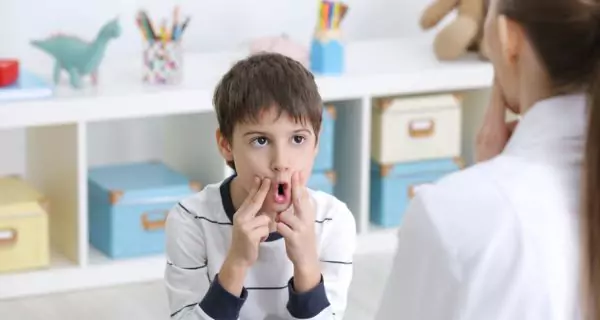
Speech problems refer to difficulties in producing sounds correctly, fluently, or with the appropriate voice tone and resonance. These challenges vary in severity and may affect both children and adults.
Types of speech problems
- Articulation disorders: difficulty forming specific speech sounds, such as “s,” “l,” or “r.”
- Fluency disorders: interruptions in the flow of speech, including stuttering or prolonged pauses.
- Resonance disorders: nasal or abnormal vocal quality due to poor airflow or muscle control.
- Apraxia of speech: trouble planning and coordinating the muscle movements required for speaking.
These problems are often addressed by speech-language pathologists, but identifying and addressing underlying causes, such as dental or hearing issues, is crucial for successful outcomes.
How dental issues affect speech

Our teeth, tongue, lips, and the roof of the mouth (palate) all work together to help us speak. When there’s a problem with any of these, speech may be affected. Below are common dental-related causes of speech problems:
Malocclusion or misaligned teeth
If your teeth are not aligned properly, it can be hard for your tongue to touch them in the right way to make sounds like “t,” “d,” or “s.”
Gaps or overcrowded teeth might create a lisp or unclear speech. Additionally, misaligned teeth or jaw problems can change the way the voice resonates, sometimes giving it a nasal tone.
Tongue-tie or lip-tie (ankyloglossia)
Tongue-tie limits the range of tongue movement in the oral cavity. This restriction makes it difficult to form sounds that require tongue elevation or flexibility, such as “l,” “th,” and “r.”
A lip tie is a condition in which the tissue connecting the upper lip to the gums is too short or too tight, restricting movement and causing difficulties with feeding, speaking, and dental health.
Missing or crooked teeth
When baby teeth fall out too early or adult teeth erupt unevenly, speech can be affected. Missing front teeth, for example, often cause problems with sounds like “s,” “sh,” and “z.”
Tooth placement helps guide tongue movements during speech. Missing or decayed baby teeth can create slurred or unclear sounds.
Mouth breathing
Kids who mostly breathe through their mouths, often due to allergies, enlarged adenoids, or other causes, may develop bad oral posture. This can affect how the jaw and palate grow, leading to unclear or muffled speech.
Orofacial myofunctional disorders (OMD), such as chronic mouth breathing, can interfere with the normal growth, development, or function of oral structures, leading to speech problems
Prolonged pacifier use or thumb sucking
Using a pacifier or sucking a thumb for too long can reshape the palate and contribute to an open bite or other malocclusions hinder articulation and may delay speech development.
Prolonged thumb-sucking may lead to dental and speech problems, affecting the alignment of teeth and causing jaw issues.
How hearing problems affect speech

To learn how to speak, children need to hear clearly. Hearing helps them recognize sounds, understand words, and repeat them correctly. When hearing is affected, speech development can be delayed.
Common hearing-related causes of speech problems
- Chronic ear infections: Frequent infections can cause temporary hearing loss, making it harder for kids to hear how words should sound.
- Sensorineural hearing loss: This type of permanent hearing loss, whether present at birth or acquired, can make it hard to hear high-frequency sounds, which are important for speech clarity.
- Auditory Processing Disorder (APD): Even when hearing tests are normal, the brain may not process sounds correctly. Kids with APD often have trouble following instructions or repeating what they hear.
Signs that hearing may be affecting speech
- talking too loudly or too softly
- mumbling or unclear speech
- trouble following verbal instructions
- delayed speech or slow language development
- mispronouncing common words despite age-appropriate understanding
If hearing loss is suspected, a comprehensive hearing evaluation by an audiologist becomes necessary. In many cases, audiology and dental evaluations complement each other to determine the root cause of speech problems.
When to see a dentist for speech problems

Not all speech problems come from the mouth, but many do. It’s important to pay attention to certain signs that may suggest a dental cause.
Signs to watch for
- slurred or unclear speech
- trouble saying specific sounds like “s,” “l,” or “r”
- delays in saying first words or putting words together
- drooling beyond toddler age (around 3 years old)
- difficulty chewing, swallowing, or moving the tongue
- breathing mostly through the mouth
- frequent choking while eating
If these signs keep showing up, as your child grows, it’s a good idea to schedule a dental checkup. A dentist can spot issues you might not see, like a short tongue (aka tongue-tie), teeth that aren’t in the right place, or habits that affect how the mouth develops.
When a dental evaluation is needed
- teeth look crooked or don’t line up properly
- there are gaps from missing baby or adult teeth
- the tongue or lips are unable move freely
- your child often chokes on food or avoids chewing certain textures
Specialists who may be involved
- Pediatric dentist: looks at how your child’s mouth and teeth are growing
- Orthodontist: fixes alignment or bite issues that may affect speech
- Oral surgeon: treats things like tongue- or lip-tie if needed
- Speech-Language Pathologist (SLP): helps improve speech in coordination with dental care
- Audiologist: checks hearing, which is also key for learning how to speak
Working as a team, these professionals help find the cause of your child’s speech issues and build a plan to improve both their oral health and communication.
Treatments that help
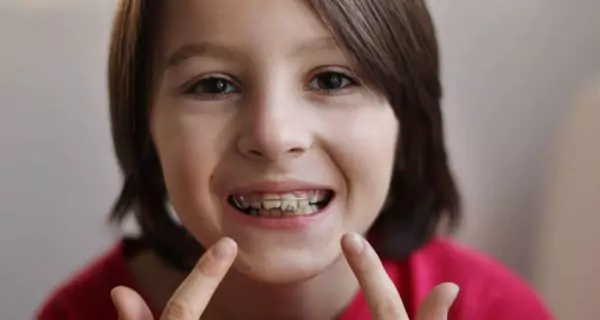
Once the cause is identified – dental, auditory, or both – a personalized treatment plan can be created. Those treatments can include:
- Orthodontic treatment: Braces, aligners, or space maintainers can reposition teeth and create proper alignment, allowing for clearer pronunciation of sounds.
Orthodontic treatment can also correct bite issues that affect speech clarity.
- Frenectomy: a simple surgical procedure to release a tongue-tie or lip-tie,it can drastically improve tongue mobility and, in many cases, resolve articulation issues.
Early intervention can prevent long-term dental and health issues.
- Dental appliances: Devices like palatal expanders help reshape the oral cavity for better function, improving both breathing and speech articulation.
These appliances can also correct narrow palates that contribute to speech problems.
- Audiological support: Hearing aids or medical treatment for ear infections can restore or improve hearing and, with it, speech clarity.
In cases of APD, therapy and classroom accommodations may be recommended.
- Regular preventive dental care: Routine cleanings, fluoride treatments, and developmental monitoring help catch oral health issues early, before they affect speech or eating habits.
Early dental visits play a crucial role in preventing cavities, establishing good oral hygiene habits, and ensuring proper dental development.
Tips for supporting clear speech at home
- Read aloud and tell stories together
- Offer crunchy foods like apples or carrots to strengthen the jaw
- Stop pacifier use after age two and discourage thumb-sucking
- Make speech practice fun, using songs and games
- Keep up with daily brushing and flossing
- Watch for signs of ear problems or hearing loss
Speech problems aren’t always about the brain; sometimes, they start with the mouth or ears. Things like misaligned teeth, tongue-tie, or hearing issues can quietly affect how a child speaks.
With early checkups and the right support, many problems can be treated. If you’re worried about your child’s speech, schedule a visit to the dentist. It could be the first step toward clearer words, better communication, and a more confident smile.
Frequently Asked Questions (FAQ)
Voice Search Snippets (Q&A)
References
1. Newman, D. (2024, September 15). Common speech and language disorders. WebMD. https://www.webmd.com/children/speech-language-disorders
2. NIDCD. (2025, March 11). Quick statistics about voice, speech, language. National Institute on Deafness and Other Communication Disorders. https://www.nidcd.nih.gov/health/statistics/quick-statistics-voice-speech-language
3. Rocha, I. A., Borges, O. A. C., Ribeiro, L. M., Oliveira, M. G., Marques, A. M., Freire, M. J., Maia, L., Martins, J. P. A., & Serra, N. J. M. (2024). Juvenile language disorders and their interaction with dentistry: a bibliometric analysis. Acta Odontológica Latinoamericana, 37(1), 68–78. https://doi.org/10.54589/aol.37/1/68
4. Tashkandi, N. E., AlDosary, R., Zamandar, H., Alalwan, M., Alwothainani, M., Aljoaid, H., Alghazhmri, D., Allam, E., Marya, A., & Adel, S. M. (2025). The relationship between malocclusion and speech patterns: a cross-sectional study. BMC Oral Health, 25(1). https://doi.org/10.1186/s12903-025-05437-0
5. Watt, S., Dyer, T., Marshman, Z., Jones, K. (2024). Does poor oral health impact on young children’s development? A rapid review. British Dental Journal 237, 255–260. https://doi.org/10.1038/s41415-024-7738-4






